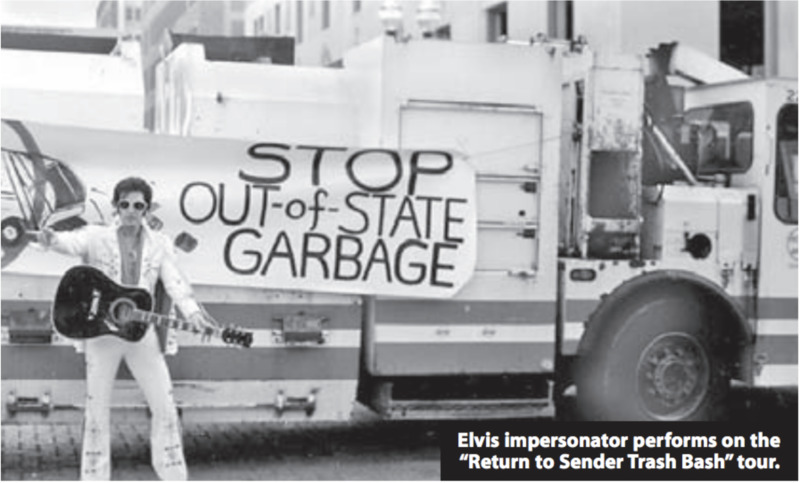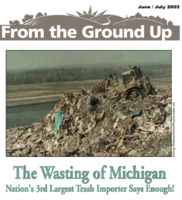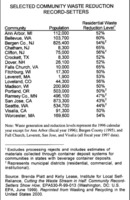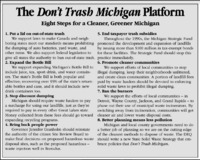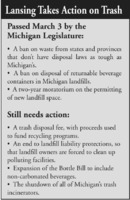Fighting Imported Trash
In the 1990’s, a campaign waged against imported trash, especially from Toronto. Southeast Michigan’s dumping fees were substantially less expensive than dumping fees elsewhere in close proximity to the city. As Toronto announced that it planned to close the city’s landfill, it needed to find another place to dispose of its waste. The Ecology Center and Project NO-WASTE rallied against plans to dump trash in Michigan by leading phone campaigns and testifying before the City of Toronto Works Committee in May, 2000.
By 2000, Ann Arbor reduced its waste consumption by 52 percent since 1996. Around this time, the City of Toronto announced that it approved a contract with Republic Industries to ship all of its trash to a landfill in Wayne County’s Sumpter Township. In March 2001, the Ecology Center along with a coalition of environmentalists argued that Toronto’s trash was unwelcome and that the long-distance shipment was financially, environmentally, and politically unwise. Joined by a group of mayors from southwest Ontario, these groups successfully petitioned the City, which eventually chose to invest more in recycling pick-up services and expand recycling and composting programs, which would lead to a higher trash diversion from landfills. This spurred Recycle Ann Arbor and the Ecology Center to release a five-point plan to increase recovery rates and reduce overall trash in the city of Ann Arbor and the county at large.
Later in 2003, the Ecology Center released its platform for Don’t Trash Michigan, a campaign to end importing both domestic and international trash to Michigan. The campaign also addressed differences in standards between states and countries’ seeking to dump in Michigan.
This became a key issue in 2004, when on March 3, the Michigan Legislature passed three bills. The first banned waste from states and provinces whose disposal laws were less stringent than Michigan’s. The second banned disposal of returnable beverage containers in Michigan landfills. The third placed a two-year moratorium on permitting new landfill space. Essentially, these measures limited waste imports. The last measure, in particular, is important because built landfills don’t sit idle.
Mike Garfield praised these measures, saying they brought “sanity to the state’s trash woes.” Yet, the Ecology Center noted that Lansing had several items left to take care of that would truly reduce waste in Michigan. The first was a trash disposal fee, with proceeds used to fund recycling programs. In 2004, Michigan accepted more imported trash than all but two states - Virginia and Pennsylvania. Yet that year, Pennsylvania enacted a $7.25 per ton tipping fee to be paid by haulers, better enforcement efforts, and disincentives to dump, making the state less attractive for dumpers than Michigan. The heighted fees largely worked to curb waste in the state - in Pennsylvania the fees led to a 20 percent drop in dumping over the first three years. The Ecology Center emphasized that fees and other restrictions not only limit waste sent to states, but also incentivize recycling and reducing waste, making these restrictions necessary to a Zero-Waste future.
According to the Ecology Center, the Michigan Legislature still needed to take action on ending landfill liability protections, so that landfill owners are forced to clean up polluting facilities and expansion of the Bottle Bill to include non-carbonated beverages. The Ecology Center also called on the Michigan Legislature to shut down all of Michigan’s trash incinerators, which leach toxic gas and liquids into the air, soil, and groundwater. For example, the Ecology Center released a report that found that Michigan landfills rank sixth highest in the nation for PVC, a plastic that when burned releases dioxin.
In 2006, it seemed that these yet unfulfilled restrictions might become a reality when the Michigan State House of Representatives introduced bill 5615, which would create a higher dumping charge - in 2006, haulers paid only 21 cents per ton - to make landfilling more expensive. The proceeds would help Michigan municipalities boost recycling, similar to what states like Pennsylvania enacted. Ultimately, however, Speaker of the House Craig DeRoche denied the bill a hearing. In response, the Ecology Center collected over 4000 letters from across the state to support an increase in Michigan’s dumping charge. In response to this campaign, DeRoche’s legislative aid simply said that raising fees was the US Congress’s job, and that the Ecology Center should lobby the federal rather than the state government.
Despite these objections, the fight was not over. On January 31, 2007, Representative Kate Ebli introduced a new bill, House Bill 2027 in the Great Lakes and Environment Committee. The committee chair, Representative Rebekah Warren took testimony on the bill, which would ban the construction of new landfills and severely restrict the expansion of existing landfills until at least 2012. The Ecology Center joined the MDEQ, Clean Water Action, Michigan Environmental Council, and Michigan League of Conservation Voters in supporting the bill. Ultimately this bill passed in the House with amended language on May 3, 2007. On May 8, 2007, the senate referred the bill to the Committee on Natural Resources and Environmental Affairs, where it was not passed.

